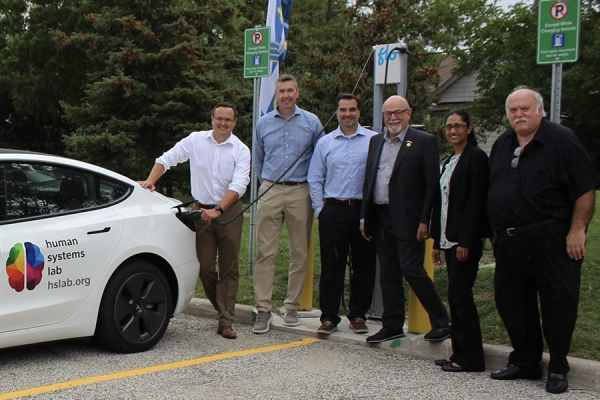 Celebrating the installation of electric vehicle charging stations on campus are Windsor-Tecumseh MP Irek Kusmierczyk, Essex Power Corporation chief operating officer Steve Ray and president John Avdoulos, UWindsor sustainability officer Nadia Harduar, and facility planning manager Danny Castellan.
Celebrating the installation of electric vehicle charging stations on campus are Windsor-Tecumseh MP Irek Kusmierczyk, Essex Power Corporation chief operating officer Steve Ray and president John Avdoulos, UWindsor sustainability officer Nadia Harduar, and facility planning manager Danny Castellan.
As the University gears up for Fall 2023, Facility Services has installed electric vehicle charging stations in campus parking lots.
Each of the 11 stations has two ports for a total of 22, with locations in the parking structure and lots outside the Education Building, Toldo Lancer Centre, Assumption Hall, and the Centre for Engineering Innovation.
Natural Resources Canada’s Zero-Emission Vehicle Infrastructure Program invested $2 million to assist Windsor-Essex in its transition to a low-carbon economy. The University of Windsor received funding covering half the cost of each charging station through Essex Powerlines’ Charge Up program.
“Charge Up Windsor has helped the University make significant improvements in electrifying our campus,” says Gillian Heisz, vice-president, finance and operations. “The two dozen EV charging stations we have installed provide an important service to our faculty, staff, students, and the greater community, and signify the University’s commitment to helping create a greener tomorrow.”
Steve Ray (BASc 1996), Essex Power Corporation chief operating officer, says more than 70 projects will see 274 Level 2 and 58 Level 3 chargers installed across Windsor-Essex by December 2024.
“The program’s adoption has surpassed our expectations,” he says. “The regional interest to build a sustainable future is only growing and it’s programs like this that will help us get there together.”
The campus installations, in response to growing campus demand, will enable drivers to charge up when coming to work, to class, or to visit, says sustainability officer Nadia Harduar.
“This strategic move will now make it possible for the University to consider electric vehicles as part of its fleet,” she says. “Providing access to charge electric vehicles may make others more inclined to consider their purchase.”
There is a fee of $1.50 per hour to charge a vehicle and drivers must still pay lot rates for parking. For further information, FAQs, and EV charging etiquette, visit the sustainability website.
